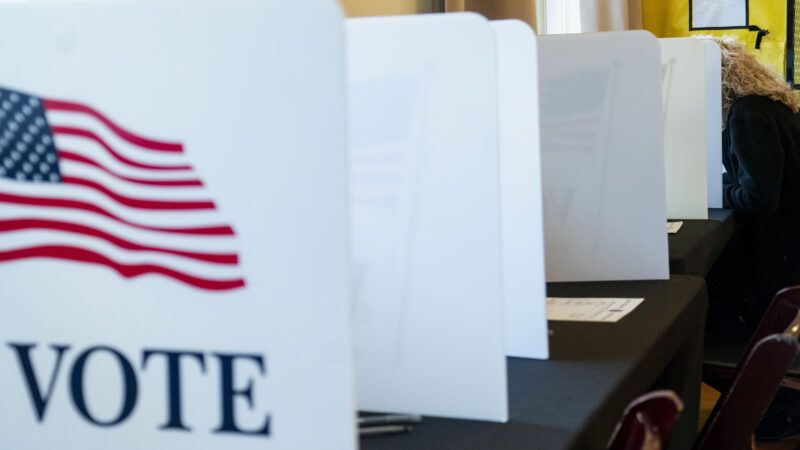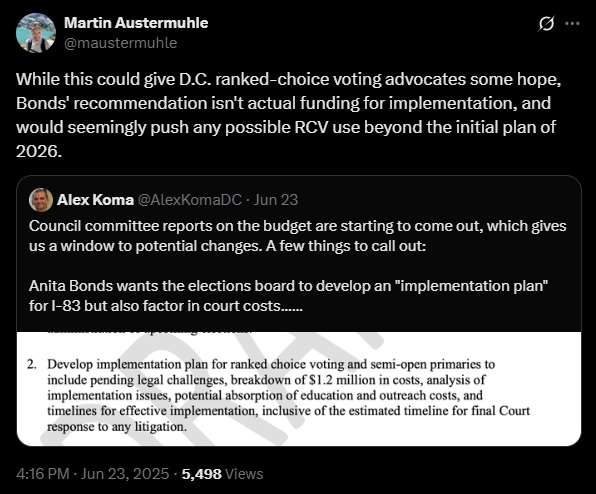D.C. Finally Moves To Implement Ranked Choice Voting After 3–1 Voter Approval
Voters overwhelmingly supported Initiative 83, but Democratic lawmakers have been hesitant to adopt it.

This week, the Council of the District of Columbia voted to fund ranked choice voting, officially backing a ballot measure that passed in November by a wide margin. This is a welcome change after some D.C. Democrats previously tried to prevent or postpone it from going into effect.
On a traditional ballot, voters pick one from a list of candidates, and whoever gets the most votes wins, even if he doesn't capture an outright majority. On a ranked choice ballot, voters rank each candidate in order of preference; if no candidate wins a majority of ballots in the first round, then the lowest performer is eliminated, and all his ballots are retallied and assigned to their second choice. This process repeats until one candidate gains a majority.
In November, Initiative 83 was on the ballot in Washington, D.C. The initiative would "allow voters to rank up to five candidates according to their preference in each contest for any office" and "permit any voter who is not registered with a political party to vote in the primary election of that voter's choosing for all offices."
Like ranked choice implementation, the second provision was consequential: Since D.C. is such an overwhelmingly Democratic city, winning a Democratic primary essentially means winning the election. But D.C. has closed primaries, effectively disenfranchising the 18 percent of D.C. voters who are registered independents.
Initiative 83 also specified, "This Initiative will not be implemented unless the D.C. Council separately chooses to appropriate funds for the projected costs."
Ahead of the election, D.C. Democratic Mayor Muriel Bowser said she was "totally against ranked choice voting" and would "be voting 'no' on the initiative." The voters disagreed with her, and the measure passed by a nearly 3–1 margin.

But Bowser's 2026 budget proposal didn't include any funding to implement Initiative 83. Councilmember Anita Bonds, a Democrat who chairs the Committee on Executive Administration and Labor, proposed the D.C. Board of Elections "develop [an] implementation plan" for Initiative 83 that would include analyses of various factors such as costs, "implementation issues," and "timelines for effective implementation." But since Bonds' proposal would otherwise adopt Bowser's budget as written, neither would actually implement ranked choice in the district. On Monday, the D.C. Council officially voted 8–4 to approve funding for the initiative. It's not the end of the line: The vote only includes the funding in the city budget, which the Council will vote on at the end of the month. Further, Monday's vote would only fund ranked choice implementation and does not address the other clause of Initiative 83—allowing independent voters into party primaries.
Still, funding the measure is a step in the right direction. For proof of that, look no further than incumbent politicians' opposition.
"Democrats talk a big game about making the U.S. electoral system fairer. But, so far, they are failing to live up to that commitment in D.C.," the Washington Post editorial board wrote last week. "Many of D.C.'s elected officials—who might face some real competition under this new system—are stalling the reforms."
Republicans have also been plenty critical of ranked choice—at least, in places where Republicans hold power. Last year, multiple states had ranked choice ballot measures. Prominent Republicans opposed them in Republican strongholds such as Idaho and Alaska.
In fairness, not all Democrats have opposed the measure in the District of Columbia. Democratic Councilmember Brianne Nadeau co-sponsored the amendment to fund Initiative 83, which passed with the votes of multiple Democrats on the Council.
But it remains the case that all too often, politicians oppose anything that threatens their power.
"While not implementing the entirety of Initiative 83, this decision will bring ranked choice voting to our nation's capital," Meredith Sumpter, CEO of FairVote, a nonprofit that advocates for ranked choice, said in a statement. "That will give DC voters greater choice and a stronger voice in their elections, and deliver better outcomes to the District of Columbia for years to come. I hope the City Council implements the entirety of Initiative 83 to fully enfranchise the District's independent voters."


Show Comments (38)